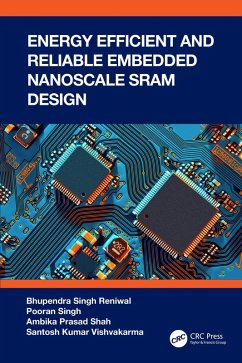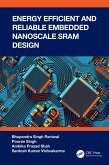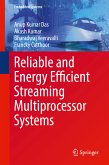Bhupendra Singh Reniwal, Pooran Singh, Ambika Prasad Shah, Santosh Kumar Vishvakarma
Energy Efficient and Reliable Embedded Nanoscale SRAM Design (eBook, PDF)
51,95 €
51,95 €
inkl. MwSt.
Sofort per Download lieferbar

26 °P sammeln
51,95 €
Als Download kaufen

51,95 €
inkl. MwSt.
Sofort per Download lieferbar

26 °P sammeln
Jetzt verschenken
Alle Infos zum eBook verschenken
51,95 €
inkl. MwSt.
Sofort per Download lieferbar
Alle Infos zum eBook verschenken

26 °P sammeln
Bhupendra Singh Reniwal, Pooran Singh, Ambika Prasad Shah, Santosh Kumar Vishvakarma
Energy Efficient and Reliable Embedded Nanoscale SRAM Design (eBook, PDF)
- Format: PDF
- Merkliste
- Auf die Merkliste
- Bewerten Bewerten
- Teilen
- Produkt teilen
- Produkterinnerung
- Produkterinnerung

Bitte loggen Sie sich zunächst in Ihr Kundenkonto ein oder registrieren Sie sich bei
bücher.de, um das eBook-Abo tolino select nutzen zu können.
Hier können Sie sich einloggen
Hier können Sie sich einloggen
Sie sind bereits eingeloggt. Klicken Sie auf 2. tolino select Abo, um fortzufahren.

Bitte loggen Sie sich zunächst in Ihr Kundenkonto ein oder registrieren Sie sich bei bücher.de, um das eBook-Abo tolino select nutzen zu können.
This reference text covers a wide spectrum for designing robust embedded memory and peripheral circuitry. It will serve as a useful text for senior undergraduate, graduate students and professionals in areas including electronics and communications engineering, electrical engineering, mechanical engineering, and aerospace engineering.
- Geräte: PC
- mit Kopierschutz
- eBook Hilfe
Andere Kunden interessierten sich auch für
![Energy Efficient and Reliable Embedded Nanoscale SRAM Design (eBook, ePUB) Energy Efficient and Reliable Embedded Nanoscale SRAM Design (eBook, ePUB)]() Bhupendra Singh ReniwalEnergy Efficient and Reliable Embedded Nanoscale SRAM Design (eBook, ePUB)51,95 €
Bhupendra Singh ReniwalEnergy Efficient and Reliable Embedded Nanoscale SRAM Design (eBook, ePUB)51,95 €![Designing Reliable and Efficient Networks on Chips (eBook, PDF) Designing Reliable and Efficient Networks on Chips (eBook, PDF)]() Srinivasan MuraliDesigning Reliable and Efficient Networks on Chips (eBook, PDF)113,95 €
Srinivasan MuraliDesigning Reliable and Efficient Networks on Chips (eBook, PDF)113,95 €![Nanoscale Semiconductor Memories (eBook, PDF) Nanoscale Semiconductor Memories (eBook, PDF)]() Nanoscale Semiconductor Memories (eBook, PDF)88,95 €
Nanoscale Semiconductor Memories (eBook, PDF)88,95 €![Advanced Field-Effect Transistors (eBook, PDF) Advanced Field-Effect Transistors (eBook, PDF)]() Advanced Field-Effect Transistors (eBook, PDF)139,95 €
Advanced Field-Effect Transistors (eBook, PDF)139,95 €![Nanoscale Semiconductors (eBook, PDF) Nanoscale Semiconductors (eBook, PDF)]() Nanoscale Semiconductors (eBook, PDF)49,95 €
Nanoscale Semiconductors (eBook, PDF)49,95 €![Stress and Strain Engineering at Nanoscale in Semiconductor Devices (eBook, PDF) Stress and Strain Engineering at Nanoscale in Semiconductor Devices (eBook, PDF)]() Chinmay K. MaitiStress and Strain Engineering at Nanoscale in Semiconductor Devices (eBook, PDF)60,95 €
Chinmay K. MaitiStress and Strain Engineering at Nanoscale in Semiconductor Devices (eBook, PDF)60,95 €![Reliable and Energy Efficient Streaming Multiprocessor Systems (eBook, PDF) Reliable and Energy Efficient Streaming Multiprocessor Systems (eBook, PDF)]() Anup Kumar DasReliable and Energy Efficient Streaming Multiprocessor Systems (eBook, PDF)40,95 €
Anup Kumar DasReliable and Energy Efficient Streaming Multiprocessor Systems (eBook, PDF)40,95 €-
-
-
This reference text covers a wide spectrum for designing robust embedded memory and peripheral circuitry. It will serve as a useful text for senior undergraduate, graduate students and professionals in areas including electronics and communications engineering, electrical engineering, mechanical engineering, and aerospace engineering.
Hinweis: Dieser Artikel kann nur an eine deutsche Lieferadresse ausgeliefert werden.
Dieser Download kann aus rechtlichen Gründen nur mit Rechnungsadresse in A, B, BG, CY, CZ, D, DK, EW, E, FIN, F, GR, HR, H, IRL, I, LT, L, LR, M, NL, PL, P, R, S, SLO, SK ausgeliefert werden.
Hinweis: Dieser Artikel kann nur an eine deutsche Lieferadresse ausgeliefert werden.
Produktdetails
- Produktdetails
- Verlag: Taylor & Francis eBooks
- Seitenzahl: 220
- Erscheinungstermin: 29. November 2023
- Englisch
- ISBN-13: 9781000985139
- Artikelnr.: 69236831
- Verlag: Taylor & Francis eBooks
- Seitenzahl: 220
- Erscheinungstermin: 29. November 2023
- Englisch
- ISBN-13: 9781000985139
- Artikelnr.: 69236831
- Herstellerkennzeichnung Die Herstellerinformationen sind derzeit nicht verfügbar.
Bhupendra Singh Reniwal received B. Tech & M. Tech from SGSITS-Indore and Ph.D. from IIT, Indore, India in 2006, 2011 and 2016 respectively. He is currently working as Assistant Professor in the Department of Electrical Engineering, Indian Institute of Technology Jodhpur, India. Post Ph.D. he has worked as a Senior Product Development Engineer, Semiconductor Vertical in UST Global Bangalore, India Mixed-Signal IP Solution Group (MIG) at Intel Corporation Penang, Malaysia, and Systems & Technology Group, ASIC Foundry, IBM Bangalore where he was involved on developing Energy Efficient Memory Architecture, I/O Circuit Design, and its pre-silicon validation, for Internet of Things (IoT), applications in subnanometric trigate FinFET processes. In IBM he was involved in R&D on low power methodology definition at Schematic2GDS level for sub-nanometric nodes, especially for FinFET memory design. He has served the Department of Electronics & Communication Engineering IIITDM Kancheepuram and BITS Pilani, as an Assistant Professor from Nov-2019 to Oct-2022 and May-Dec 2017, respectively. He is a recipient of the prestigious SIRE-2022 Faculty Fellowship from the Department of Science & Technology (DST) GOI and joined University of Virginia, USA as a Visiting Faculty. He received the User Design Best Research Paper Award in IEEE 29th International Conference on VLSI Design and Best Poster Presentation Award for Ultra Low Power SRAM Design in Ramanujan Conclave 2016. He is a recipient of the International Travel Award as early recognition in Solid State Circuit Design from the Association of Computing Machinery (ACM), NY, USA, and DST.
Dr. Pooran Singh is an Assistant Professor in the Department of Electrical and Computer Engineering at Mahindra University École Centrale School of Engineering. Dr. Pooran graduated with a Ph.D. from the Department of Electrical Engineering, IIT Indore. He is a Fulbright-Nehru Doctoral Fellow (2014-15). Under Fulbright Fellowship he was associated with the Department Electrical and Computer Engineering, Georgia Institute of Technology, Atlanta USA for a period of one year. Prior to joining MU, he was an Analog Design Engineer (SRAM Design) at Intel Microelectronics, Penang, Malaysia. Over there his his primary work included designing SRAM circuits, Pre-layout SRAM design and analysis of its various design parameters i.e. read margin/write margin, critical path, read/write performance, dynamic and leakage power at different PVT values for Intel's 7nm and 10nm FPGAs. His primary research work includes designing low power and robust SRAM for space applications, In-Memory compute and for IoT devices.
Dr. Ambika Prasad Shah is currently working as an Assistant Professor, Electrical Engineering Department, and Associate Dean Corporate Relations at Indian Institute of Technology Jammu, India. He received Ph.D. degree from the Electrical Engineering Department, Indian Institute of Technology Indore, India. Before joining IIT Jammu, Dr. Shah worked as a Postdoctoral Fellow at the Institute for Microelectronics, TU Vienna, Austria. He is the recipient of the Young Scientist Award from the M.P. Council of Science and Technology Bhopal, M.P. India. He has authored/co-authored more than 70 research papers in peer-reviewed international journals and conferences. He was the Conference Organizing Chair for VDAT-2022 and Fellowship Chair for VLSID-2022. He is a fellow of IETE, senior member of IEEE, and member of ACM, ISTE, ISCA, IEI, and IAENG.
His current research interest includes reliability analysis of digital circuits, Design for reliability, fault-tolerant circuits, reliability modeling, low power high-performance circuit designs, and Hardware Security circuits.
Prof. Santosh Kumar Vishvakarma is with the Department of Electrical Engineering, Indian Institute of Technology Indore, MP, India as Professor. He is engaged with teaching and research in the area of Energy-Efficient and Reliable SRAM Memory Design, Enhancing Performance and Configurable Architecture for DNN Accelerators, SRAM based In-Memory Computing Architecture for Edge AI, Reliable, Secure Design for IoT Application, Design for Reliability. Prof. Vishvakarma is the reviewer of various Journals like IEEE Transaction on Electron Devices, IEEE Transaction on Nanotechnology, IEEE Transaction on VLSI Integration System, Elsevier Microelectronics Journal, Elsevier Integration the VLSI Journal, IEEE Transaction on VLSI Integration System, Analog Integrated Circuits and Signal Processing Springer, Circuits, Systems & Signal Processing (CSSP), Solid State Electronics etc. He is a Member of IEEE, Professional Member of VLSI Society of India, Associate Member of Institute of Nanotechnology, Life member of Indian Microelectronics Society (IMS), India.
He is the General Chair of 23rd International Symposium on VLSI Design and Test (VDAT-2019) On July 4-6, 2019, IIT Indore, India.
Prof. Vishvakarma did schooling from Gorakhpur itself and then Bachelor of Science (B.Sc.) in Electronics, Master of Science (M.Sc.) in Electronics and Master of Technology (M.Tech.) in Microelectronics from University of Gorakhpur, Devi Ahilya Vishvidayalaya Indore and Panjab University Chandigarh in 1999, 2001 and 2003 respectively. Dr. Vishvakarma obtained Ph.D. degree on the topic "Analytical Modeling of Low Leakage MGDG MOSFET and its Application to SRAM" from Microelectronics and VLSI Group, Department of Electronics and Computer Engineering, Indian Institute of Technology, Roorkee (IITR) in 2010 and worked under the supervision of Prof. S. Dasgupta, & Prof. A. K. Saxena in the area of MOS device modeling and SRAM circuit design.
Dr. Pooran Singh is an Assistant Professor in the Department of Electrical and Computer Engineering at Mahindra University École Centrale School of Engineering. Dr. Pooran graduated with a Ph.D. from the Department of Electrical Engineering, IIT Indore. He is a Fulbright-Nehru Doctoral Fellow (2014-15). Under Fulbright Fellowship he was associated with the Department Electrical and Computer Engineering, Georgia Institute of Technology, Atlanta USA for a period of one year. Prior to joining MU, he was an Analog Design Engineer (SRAM Design) at Intel Microelectronics, Penang, Malaysia. Over there his his primary work included designing SRAM circuits, Pre-layout SRAM design and analysis of its various design parameters i.e. read margin/write margin, critical path, read/write performance, dynamic and leakage power at different PVT values for Intel's 7nm and 10nm FPGAs. His primary research work includes designing low power and robust SRAM for space applications, In-Memory compute and for IoT devices.
Dr. Ambika Prasad Shah is currently working as an Assistant Professor, Electrical Engineering Department, and Associate Dean Corporate Relations at Indian Institute of Technology Jammu, India. He received Ph.D. degree from the Electrical Engineering Department, Indian Institute of Technology Indore, India. Before joining IIT Jammu, Dr. Shah worked as a Postdoctoral Fellow at the Institute for Microelectronics, TU Vienna, Austria. He is the recipient of the Young Scientist Award from the M.P. Council of Science and Technology Bhopal, M.P. India. He has authored/co-authored more than 70 research papers in peer-reviewed international journals and conferences. He was the Conference Organizing Chair for VDAT-2022 and Fellowship Chair for VLSID-2022. He is a fellow of IETE, senior member of IEEE, and member of ACM, ISTE, ISCA, IEI, and IAENG.
His current research interest includes reliability analysis of digital circuits, Design for reliability, fault-tolerant circuits, reliability modeling, low power high-performance circuit designs, and Hardware Security circuits.
Prof. Santosh Kumar Vishvakarma is with the Department of Electrical Engineering, Indian Institute of Technology Indore, MP, India as Professor. He is engaged with teaching and research in the area of Energy-Efficient and Reliable SRAM Memory Design, Enhancing Performance and Configurable Architecture for DNN Accelerators, SRAM based In-Memory Computing Architecture for Edge AI, Reliable, Secure Design for IoT Application, Design for Reliability. Prof. Vishvakarma is the reviewer of various Journals like IEEE Transaction on Electron Devices, IEEE Transaction on Nanotechnology, IEEE Transaction on VLSI Integration System, Elsevier Microelectronics Journal, Elsevier Integration the VLSI Journal, IEEE Transaction on VLSI Integration System, Analog Integrated Circuits and Signal Processing Springer, Circuits, Systems & Signal Processing (CSSP), Solid State Electronics etc. He is a Member of IEEE, Professional Member of VLSI Society of India, Associate Member of Institute of Nanotechnology, Life member of Indian Microelectronics Society (IMS), India.
He is the General Chair of 23rd International Symposium on VLSI Design and Test (VDAT-2019) On July 4-6, 2019, IIT Indore, India.
Prof. Vishvakarma did schooling from Gorakhpur itself and then Bachelor of Science (B.Sc.) in Electronics, Master of Science (M.Sc.) in Electronics and Master of Technology (M.Tech.) in Microelectronics from University of Gorakhpur, Devi Ahilya Vishvidayalaya Indore and Panjab University Chandigarh in 1999, 2001 and 2003 respectively. Dr. Vishvakarma obtained Ph.D. degree on the topic "Analytical Modeling of Low Leakage MGDG MOSFET and its Application to SRAM" from Microelectronics and VLSI Group, Department of Electronics and Computer Engineering, Indian Institute of Technology, Roorkee (IITR) in 2010 and worked under the supervision of Prof. S. Dasgupta, & Prof. A. K. Saxena in the area of MOS device modeling and SRAM circuit design.
Chapter 1
Introduction
Chapter 2
Design Metrics for Embedded SRAM
Chapter 3
SRAM Bitcells Over Conventional Memories
Chapter 4
Offset correction in Sense Amplifier
Chapter 5
Data Sensing in SRAM a Hybrid Approach with FinFET
Chapter 6
Bias Temperature Instability Aware and Soft Error Tolerant SRAM Cell
Introduction
Chapter 2
Design Metrics for Embedded SRAM
Chapter 3
SRAM Bitcells Over Conventional Memories
Chapter 4
Offset correction in Sense Amplifier
Chapter 5
Data Sensing in SRAM a Hybrid Approach with FinFET
Chapter 6
Bias Temperature Instability Aware and Soft Error Tolerant SRAM Cell
Chapter 1
Introduction
Chapter 2
Design Metrics for Embedded SRAM
Chapter 3
SRAM Bitcells Over Conventional Memories
Chapter 4
Offset correction in Sense Amplifier
Chapter 5
Data Sensing in SRAM a Hybrid Approach with FinFET
Chapter 6
Bias Temperature Instability Aware and Soft Error Tolerant SRAM Cell
Introduction
Chapter 2
Design Metrics for Embedded SRAM
Chapter 3
SRAM Bitcells Over Conventional Memories
Chapter 4
Offset correction in Sense Amplifier
Chapter 5
Data Sensing in SRAM a Hybrid Approach with FinFET
Chapter 6
Bias Temperature Instability Aware and Soft Error Tolerant SRAM Cell







